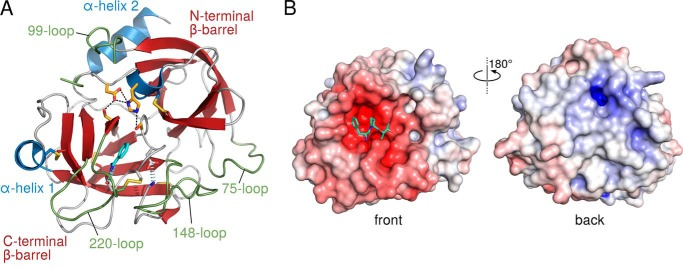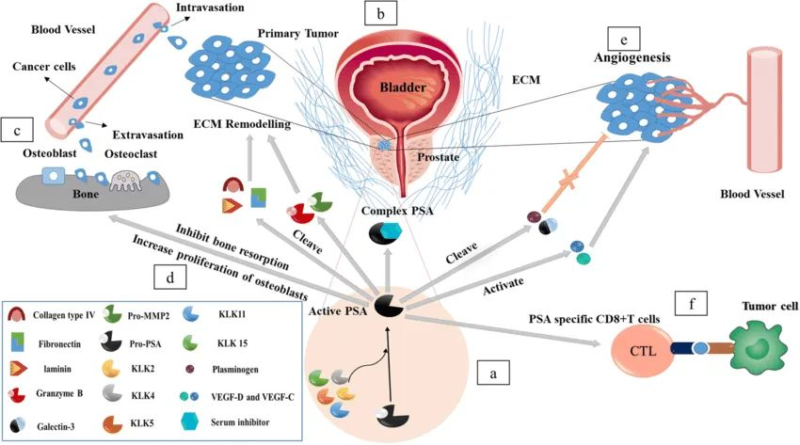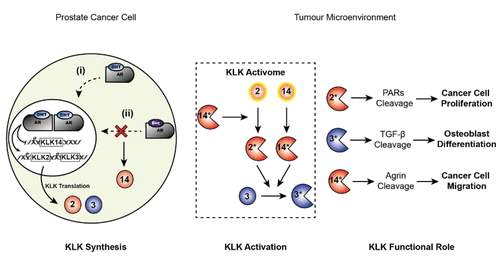Abstract: Kallikrein 2(KLK2) is the trypsin-like serine protease, about 78% homologous with prostate-specific antigen(PSA). Androgen receptor(AR) regulated-KLK2 is specifically expressed in prostatic epithelial and cancer cells. KLK2 plays an important role in the development of prostate cancer, and relevant to tumor invasion. Thus, KLK2 is considered to be a potential biomarker for prostate cancer targeted therapy and other hormone-associated tumors(e.g. breast cancer).
Keywords: Prostate Cancer, Kallikrein 2(KLK2), Targeted Therapy, Targeted Drug
1. KLK2 Structure
KLK2 is the prolate ellipsoid shaped serine protease, containing two six-stranded β-barrels, five disulfide bonds, specific cis-Pro-219 and 310-helix. Substrate-binding pocket S1 carries obvious negative electricity. The back has the positively charged region similar to anion-binding exosite II of thrombin, which can bind with regulatory factors(e.g. heparin) to promote the interaction with PCI. Structures of KLK2 are highly similar with classical Kallikreins(e.g. KLK3) and trypsins. Thus, KLK2 is the important target for prostate cancer.

2. Function and Mechanism of KLK2
KLK2 is the Kallikrein family member and works with PSA to specifically cut N-terminal peptide chain of proPSA and activate the function. Thus, KLK2 is the key regulatory factor of PSA bioactivity. The gene expression is regulated by testosterone. Androgen response element (ARE) in the promoter region enables the expression level of KLK2 closely related to androgen receptor activity, showing the typical hormone-dependent expression pattern. KLK2 can also promote angiogenesis and tumor microenvironment remodeling to increase tumor invasion. KLK2 plays an important role in the development of prostate cancer.

3. KLK2 Synthetic Pathway
The synthesis and expression of KLK2 is strictly regulated by androgen or androgen receptor (AR) signaling pathway. After Androgen(e.g. DHT) binds with AR, AR is dimerized and translocated to the nucleus. Binding on the androgen response element (ARE) of target gene promoter initiates the transcription of various genes(e.g. KLK2). KLK2 is one of the target genes directly regulated by AR and widely involved in extracellular proteolysis and signaling pathway related to prostate cancer as the Kallikrein family member. The high expression is the diagnostic marker of prostate cancer. KLK2 also plays an important role in promoting tumor cell proliferation and tumor microenvironment remodeling.

4. KLK2 Targeted Therapy
KLK2 is the potential new target for prostate cancer treatment and widely concerned by the industry. Various therapeutic strategies for KLK2 have been accelerated, e.g. radioligand therapy(RLT), bispecific antibody, small molecule drugs etc. Most of them are still in the early development, but show bright prospect in strong targeted specificity and drug resistance. Accumulation of clinical data can expect the first approved KLK2 targeted drug, providing more accurate and effective treatment choice to patients with advanced prostate cancer.
4.1. Radioligand Therapy(RLT)
Directly deliver radiation to tumor cell and accurately kill via radioligand bound with KLK2.
Representative drug: JNJ-6420(225Ac labeled antibody against KLK2)
4.2. Bispecific Antibody
Design antibodies to simultaneously recognize KLK2 and immunocytes. Activate the immune system to remove tumor.
Representative drug: JNJ-78278343(KLK2-CD3 Bispecific Antibody)
4.3. Small Molecular Inhibitors and Antibody-drug Conjugates (ADC)
Inhibit KLK2 activity or target delivery of toxin to cells expressing KLK2.
Representative drug: ABBV-766(KLK2-Tubulysin ADC)
5. Recommended Products
| Recommended Recombinant Protein | |||
| Cat.No | Product Name | Host | Mol. Weight |
| P1910 | Recombinant Human KLK2 | E.Coli | 28 kDa |
| P2871 | Recombinant Human KLK2 | HEK293 cells | 34 kDa |
| Recommended Antibody | |||
| Cat.No | Product Name | Host | Clonality |
| FNab04458 | KLK2 antibody | Rabbit | polyclonal |
| Recommended ELISA Kit | |||
| Cat.No | Product Name | Sensitivity | Range |
| EH0818 | Human KLK2 ELISA Kit | 0.094ng/ml | 0.156-10ng/ml |
REFERENCES
[1]Human kallikrein 2: A novel lineage-specific surface target in prostate cancer, PMID: 40627156.
[2]Structure-based identification of bioactive phytochemicals targeting kallikrein-related peptidase 2 for prostate cancer therapy, PMID: 40207180.
